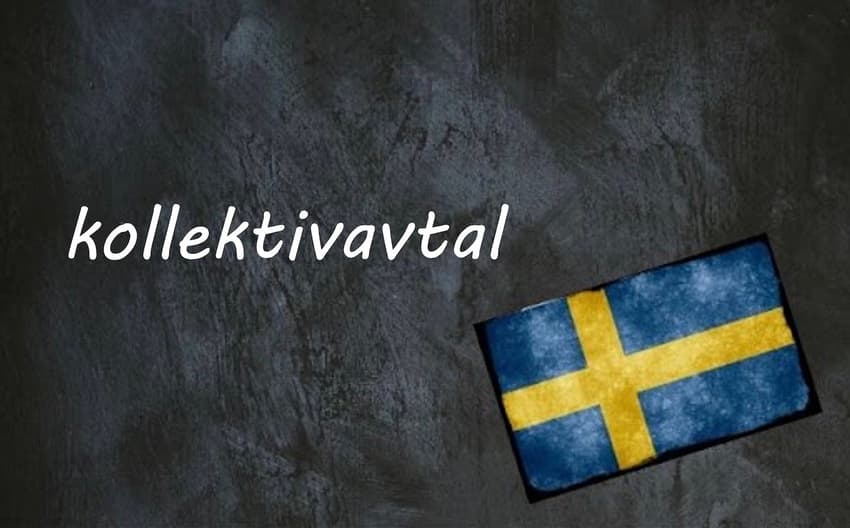Swedish word of the day: kollektivavtal

This Swedish word is very useful to know if you're job-searching or experiencing problems at work.
Kollektivavtal can be broken down into two words: kollektiv (collective) + avtal (deal). The English language translation would be 'collective bargaining agreement', and this refers to a set of working conditions agreed between employers and union representatives.
You'll hear this word a lot in Sweden, where around 90 percent of employees are covered by a kollektivavtal.
A kollektivavtal will regulate wages, for example stipulating that all employees with a certain job title must receive a salary within a certain pay band, as well as holiday allowance, overtime pay, working hours, and other benefits.
The agreement then applies to all employees at the company, even those who are not members of the union. However, it's possible to have clauses that only cover a certain category of employees; for example, it's relatively common for a kollektivavtal to include an extra week of holiday for workers aged over 40.
The big advantage of a kollektivavtal is that they often offer employees more favourable conditions than workplaces without these agreements. That's because some things are regulated by Swedish employment law; for example, the Annual Leave Act dictates that employees must receive no fewer than 25 days' holiday, and a kollektivavtal can offer more than this, but not less.
The opposing argument is that the kollektivavtal limits the ability of individual employees to negotiate. For example, if you've had a particularly successful year at work, you might go into your annual review hoping to argue the case for a significant pay rise, but if your workplace is governed by a kollektivavtal, this might just not be possible.
One of the main effects of the kollektivavtal is to regulate wage increases, to ensure that employees continue to get real wage increases.
However, negotiations between employers and unions do not always go completely smoothly, and when discussions about the kollektivavtal break down, strikes may be called.
READ ALSO:
- Why do the Swedes take such long summer holidays?
- Why are strikes so rare in Sweden?
- 10 things Sweden should do to make life better for international talent
Examples
Har ni kollektivavtal?
Do you have a collective bargaining agreement? (An important question to ask at job interviews)
Ett kollektivavtal är faktiskt flera avtal som gäller lön, semester, pension med mera
A collective bargaining agreement is actually several agreements which apply to wages, holidays, pension and more
Comments
See Also
Kollektivavtal can be broken down into two words: kollektiv (collective) + avtal (deal). The English language translation would be 'collective bargaining agreement', and this refers to a set of working conditions agreed between employers and union representatives.
You'll hear this word a lot in Sweden, where around 90 percent of employees are covered by a kollektivavtal.
A kollektivavtal will regulate wages, for example stipulating that all employees with a certain job title must receive a salary within a certain pay band, as well as holiday allowance, overtime pay, working hours, and other benefits.
The agreement then applies to all employees at the company, even those who are not members of the union. However, it's possible to have clauses that only cover a certain category of employees; for example, it's relatively common for a kollektivavtal to include an extra week of holiday for workers aged over 40.
The big advantage of a kollektivavtal is that they often offer employees more favourable conditions than workplaces without these agreements. That's because some things are regulated by Swedish employment law; for example, the Annual Leave Act dictates that employees must receive no fewer than 25 days' holiday, and a kollektivavtal can offer more than this, but not less.
The opposing argument is that the kollektivavtal limits the ability of individual employees to negotiate. For example, if you've had a particularly successful year at work, you might go into your annual review hoping to argue the case for a significant pay rise, but if your workplace is governed by a kollektivavtal, this might just not be possible.
One of the main effects of the kollektivavtal is to regulate wage increases, to ensure that employees continue to get real wage increases.
However, negotiations between employers and unions do not always go completely smoothly, and when discussions about the kollektivavtal break down, strikes may be called.
READ ALSO:
- Why do the Swedes take such long summer holidays?
- Why are strikes so rare in Sweden?
- 10 things Sweden should do to make life better for international talent
Examples
Har ni kollektivavtal?
Do you have a collective bargaining agreement? (An important question to ask at job interviews)
Ett kollektivavtal är faktiskt flera avtal som gäller lön, semester, pension med mera
A collective bargaining agreement is actually several agreements which apply to wages, holidays, pension and more
Join the conversation in our comments section below. Share your own views and experience and if you have a question or suggestion for our journalists then email us at [email protected].
Please keep comments civil, constructive and on topic – and make sure to read our terms of use before getting involved.
Please log in here to leave a comment.